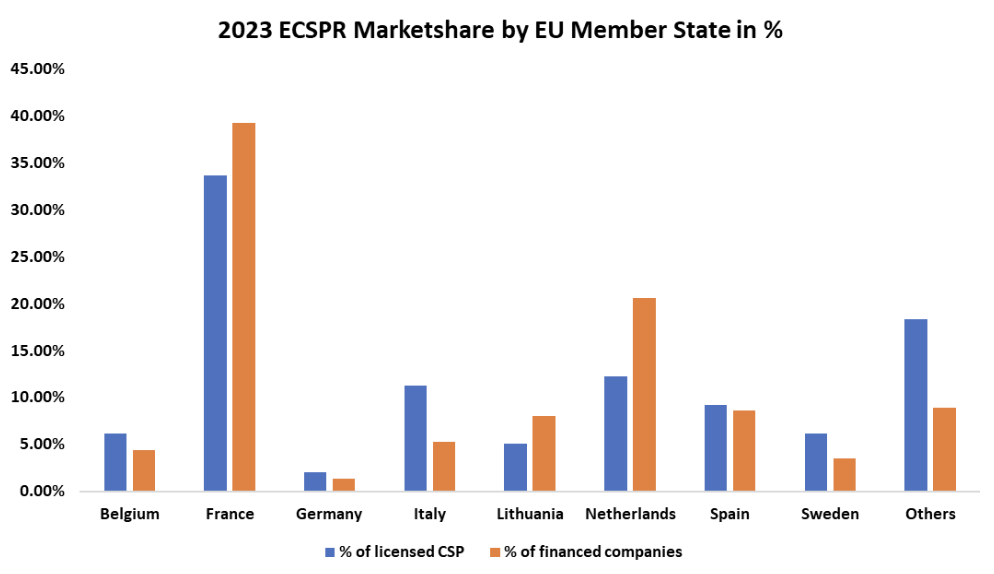ECSPR
ECSPR Monitor 7: The Impact of ECSPR Licensing on Cross-Border Activity

Reviewing licensed ECSPR (European Crowdfunding Service Provider Regulation) service providers in 2023 reveals noteworthy insights into the state of cross-border activity within the European crowdfunding landscape. Initially anticipated to facilitate increased cross-border operations, the licensing distribution presents a nuanced picture, suggesting a disparity between initial policy expectations and market realities.
1. Limited Cross-Border Authorization:
The data underscores a trend wherein a significant majority, accounting for 73% of licensed service providers, have received authorization solely to operate within their home country. This indicates a prevailing inclination towards domestic market focus, suggesting a cautious approach among service providers toward business expansion.
2. Minimal Pan-European Coverage:
Just 10% of licensed ECSPRs have obtained approval to offer services across all 27 European Union member states. This limited representation of pan-European service providers suggests perceived challenges or barriers hindering widespread adoption of cross-border operations.
3. Limited Multi-Market Expansion:
Furthermore, 17% of licensed ECSPRs possess authorization to operate in more than one member state, interestingly, the distribution of service providers with multi-market licenses reveals a varied landscape, with the number of member states served ranging from 2 to 9. This additional diversity highlights a for now nuanced approach to cross-border expansion, with targeted multi-market strategies complementing comprehensive pan-European strategies.
4. Discrepancy in Cross-Border Transactions Based on Platform Location
Our preliminary 2023 data on cross-border transactions presents an interesting observation regarding platforms' locations and their transactional activities, with visible discrepancy in market activity. This discrepancy suggests that certain platforms are actively engaged in cross-border operations, serving markets beyond their home jurisdictions. Such platforms demonstrate a strategic approach to leveraging regulatory status and expanding their market reach by facilitating transactions in multiple countries.

The presence of such discrepancies underscores the evolving nature of crowdfunding platforms and their increasingly international operations. Understanding the dynamics of cross-border transactions is crucial for comprehending the broader trends within the crowdfunding ecosystem. Platforms with cross-border capabilities are set to play a pivotal role in fostering international collaboration and driving the growth of the crowdfunding sector.
4. Regulatory Expectations vs. Market Realities:
The discrepancy between regulatory expectations and market realities underscores the complex interplay of factors influencing cross-border crowdfunding activities. The observed licensing distribution suggests that market participants may be navigating additional complexities or considerations that limit their appetite for cross-border operations, such as national rules on consumer protection, marketing, applicable languages, and taxation.
5. Implications for Future Policy Development:
Understanding the factors driving service providers' licensing decisions can inform future policy development aimed at promoting cross-border crowdfunding activities, both on national and EU level. Addressing barriers or uncertainties surrounding cross-border operations could encourage greater participation and foster a more interconnected European crowdfunding ecosystem.
6. Conclusion
In conclusion, while the ECSPR framework represents a significant step towards harmonizing crowdfunding regulations and promoting cross-border activities, the observed licensing distribution highlights the need for further examination over time. To better align regulatory objectives with market dynamics additional data needs to address the underlying factors influencing service providers' licensing decisions. However, even with just under 30% of license holders opting for some form of cross border business model, ECSPR has already made a notable impact on the market.
